EMPLOYMENT IN THE MARKET ECONOMY IN ... - Eurostat - Europa
EMPLOYMENT IN THE MARKET ECONOMY IN ... - Eurostat - Europa
EMPLOYMENT IN THE MARKET ECONOMY IN ... - Eurostat - Europa
Create successful ePaper yourself
Turn your PDF publications into a flip-book with our unique Google optimized e-Paper software.
Chapter 1— Employment and value-added<br />
These two countries apart, business services was the<br />
second largest sector of employment in all EU15 countries.<br />
In all of the new Member States, except for the<br />
Czech Republic and Estonia, on the other hand, transport<br />
and communications employed more people,<br />
probably reflecting the less developed nature of business<br />
services.<br />
Hotels and restaurants were a particularly important<br />
source of employment in Cyprus (30% of total market<br />
services), Malta (22%) and Ireland (21%), though in<br />
each case, apart from Cyprus, the number employed<br />
was relatively small in relation to working-age population.<br />
Division of value-added between services<br />
Business services and transport and communication<br />
sectors accounted for a larger share of value-added<br />
than employment in most countries. In particular, the<br />
specific features of the real estate and renting sector<br />
which generates significant value-added with a limited<br />
work force tends to distort the overall distribution<br />
among market service sectors. The sector has been<br />
therefore excluded from business services (business<br />
services represent 32% of total market service<br />
value-added after adjustment against 38% before).<br />
The reverse was true for distributive trades and more<br />
particularly for hotels and restaurants, where the<br />
value-added generated was relatively small.<br />
Stability of SBS data in market services<br />
A comparison of the SBS data for employment between<br />
the two years 2000 and 2001, as in the case of industry,<br />
provides a test of the consistency of the statistics. In the<br />
case of market services, however, the number employed<br />
increased by around 2% in the EU15 between these two<br />
years according to the SBS. National accounts data<br />
show much the same increase, so reinforcing confidence<br />
in the statistics. Taken together, employment in<br />
market services grew in all countries between the two<br />
years, except in Finland where employment fell by under<br />
1% (Table 9).<br />
Growth in employment was particularly high in business<br />
services. This is in line with other data sources (the LFS in<br />
particular) which indicate that these services have been<br />
a major source of job growth for the past decade or more.<br />
Employment in services by detailed sector<br />
At the NACE division level (2-digit code), over 20% of<br />
those employed in market services in 2001 worked in<br />
retailing (NACE 52) in most EU countries. The proportion<br />
was in general relatively large in the new Member<br />
States where other services tend to be less developed<br />
(Table 10). In Latvia and Lithuania, therefore, as well<br />
as Romania and Bulgaria, the figure was close to 30%.<br />
In the majority of countries, retailing accounted for<br />
over half of those employed in the distributive trades.<br />
The share employed in wholesaling, however, varied<br />
significantly between countries — from over 20% in<br />
Slovakia to 10% in the UK — reflecting differences in<br />
distribution arrangements and, in some degree, in the<br />
average size of retailers (large retailers tending to purchase<br />
goods directly from manufacturers rather than<br />
through wholesalers).<br />
The division of employment between sectors within<br />
business services also varies, in this case partly reflecting<br />
the level of development of the sector. Computer<br />
and related activities accounted for 4% of<br />
overall employment in market services in the EU15 in<br />
2001, but for 8% in Sweden and 6% in Finland, while in<br />
Spain the share was only 2% and in Portugal 1%. The<br />
share was similarly small in most of the new Member<br />
States. It was largest in the Czech Republic and<br />
Slovakia (3%) but still below the EU average (Table<br />
11). Accounting, consultancy and legal services were<br />
responsible for 7–8% of total employment in market<br />
service in the three Benelux countries, Sweden and<br />
the UK, but for only 1–2% in Lithuania, Latvia and<br />
Slovakia as well as in Bulgaria and Romania. Some<br />
9–10% of market service employment was in agencies<br />
specialising in labour recruitment and the provision of<br />
personnel in each of the three Benelux countries, but<br />
very little at all in the new Member States as well as in<br />
Sweden and Ireland. (It should be noted that workers<br />
employed through such agencies are classified to this<br />
sector in the SBS rather than to the sector in which they<br />
actually work.)<br />
Value-added in services by detailed sector<br />
The division of value-added between detailed sectors<br />
within market services follows a similar pattern to that of<br />
employment, with the main exception that real estate and<br />
rental activities account for a much larger share of<br />
23



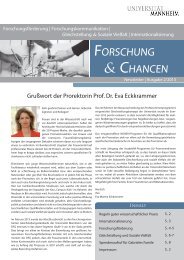
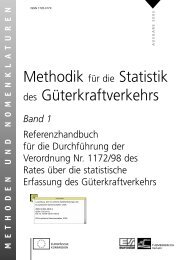

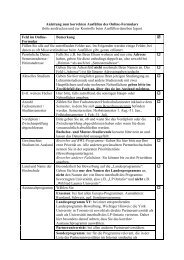


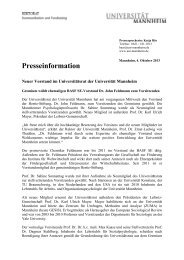
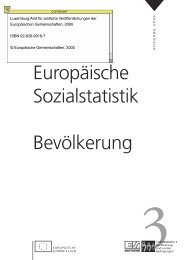

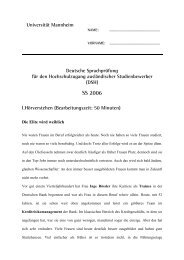
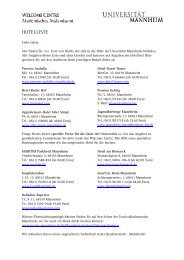
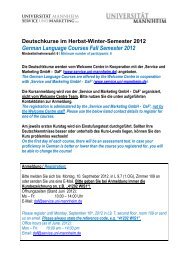
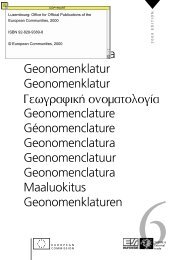
![226. [Augsburg], 27. Oktober 1562 An Joachim Camerarius d. Ã ...](https://img.yumpu.com/27559109/1/184x260/226-augsburg-27-oktober-1562-an-joachim-camerarius-d-a-.jpg?quality=85)